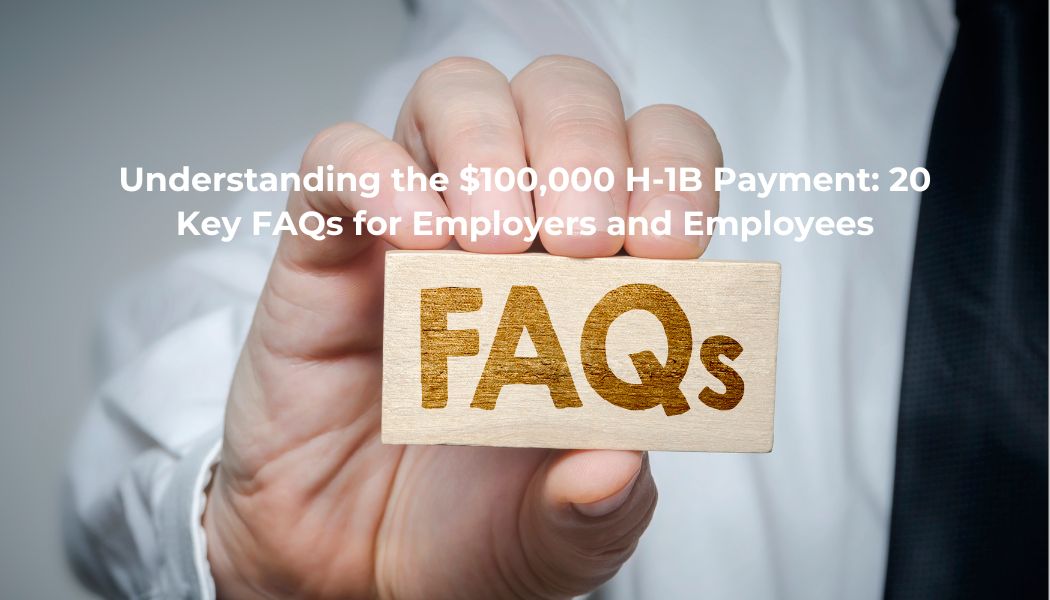
Understanding the $100,000 H-1B Payment: 20 Key FAQs for Employers and Employees
On September 19, 2025, the President issued a Proclamation on the Restriction on Entry of Certain Nonimmigrant Workers, marking one of the most significant changes to the H-1B program in decades. Effective 12:01 a.m. EDT, September 21, 2025, certain H-1B petitions must include a $100,000 payment as a condition of eligibility. The following twenty FAQs summarize when the payment applies and when it does not.
- What is the $100,000 H-1B payment?
It is an additional mandatory fee established by Presidential Proclamation, required for certain H-1B filings, to be paid via pay.gov prior to petition submission. - Who must pay it?
Only the petitioning employer is responsible; it cannot be passed on to the foreign national. - When does the requirement begin?
It applies to all petitions filed on or after September 21, 2025, 12:01 a.m. EDT. - Which petitions are covered?
Any new H-1B petition filed for a beneficiary outside the United States who does not hold a valid H-1B visa. - Are nonprofit organizations exempt?
No. Nonprofit and research institutions are not exempt under the current language of the Proclamation. - Are physicians exempt?
No. The rule applies to medical professionals and physicians seeking H-1B classification in the same manner as other workers. - Do J-1 physicians or their dependents converting to H-1B owe the payment?
If a J-1 exchange visitor’s spouse changes to H-1B status within the United States, the payment does not apply because the filing qualifies as a change of status granted domestically. - What about concurrent H-1B filings?
A concurrent H-1B petition for a worker already in valid H-1B status within the United States does not require the $100,000 payment. - Does the rule apply to cap-subject petitions for FY 2026?
Yes, but only when the beneficiary is outside the United States and lacks a valid H-1B visa at the time of filing. - What if the petition requests consular processing?
The fee still applies. Any petition that requests consular notification, port-of-entry inspection, or pre-flight clearance falls under the payment requirement. - Does it affect petitions filed for workers already in the U.S.?
If the worker is in a valid nonimmigrant status (H-1B, F-1, L-1, J-1, L-2, or H-4) and the employer files a change of status, extension, or amendment within the United States, the $100,000 payment is not required, provided USCIS approves the change. - What if USCIS denies the change or determines status was invalid?
Then the Proclamation applies, and the $100,000 payment becomes due before visa issuance or re-entry. - Are petitions filed before September 21, 2025, affected?
No. Any filing submitted prior to that date remains exempt. - Are existing H-1B visa holders affected?
No. The rule does not impact current, valid H-1B visas or approved petitions already in use. - Can workers travel and return on the same H-1B visa without paying?
Yes. The Proclamation does not restrict travel or re-entry for individuals with an unexpired H-1B visa. - If USCIS grants an extension and the worker later travels abroad, is payment needed for stamping?
No. If the petition was approved while the worker remained in the U.S., no payment is due even for later visa stamping. - How should the payment be made?
Employers must use pay.gov at https://www.pay.gov/public/form/start/1772005176 and include proof of payment with the petition. - What if payment proof or exception documentation is missing?
Petitions subject to the rule but filed without proper documentation will be denied by USCIS. - Can the payment be refunded if the case is denied?
No. The Proclamation provides no refund process once the payment is made. - Are there any exceptions, and how are they requested?
Exceptions are rare and may only be granted by the Secretary of Homeland Security when the worker’s presence is deemed in the national interest, no U.S. worker is available, the worker poses no security or welfare risk, and requiring the payment would undermine U.S. interests.
By: Rahul Reddy
Rahul Reddy is the founding partner of Reddy Neumann Brown PC. He founded our firm in 1997 and has over 28 years of experience practicing employment-based immigration. Rahul‘s vast knowledge of the complex immigration system makes him an invaluable resource and an expert in the field. His personal experience with the immigration system has made him empathetic to each of his clients’ cases and empowered him to help others achieve the American Dream.
Rahul‘s dedication to serving the immigrant community is evident, from his daily free conference calls to his weekly immigration Q&As on Facebook and YouTube Live. He is an active member of the immigrant community and one of the founders of ITServe Alliance. He has been a member of American Immigration Lawyers Association since 1995.

